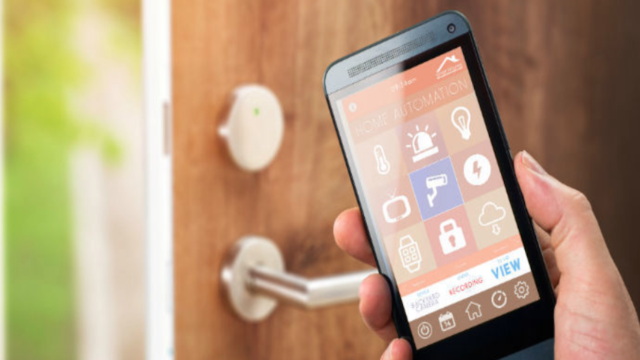Smart locks are designed to provide tight security through biometric identification and mechanisms that can’t be picked. Smart locks open with a thumbprint, an app, facial recognition, or a standard electronic key fob. Smart locks aren’t complicated, however, the issue surrounding their use is both complicated and controversial.
Tenants won the New York smart lock controversy
Contents [show]
In 2018, a New York landlord installed Latch smart locks on an apartment building, forcing all tenants to use an app or electronic key to enter the main building. Not everyone was happy with the switch and requested the option to continue using a physical key. When tenants were denied physical keys, they sued the landlord. In 2019, a settlement was reached favoring the tenants.
Tenants rejected the smart locks out of concern for their privacy; Latch’s privacy policy explicitly stated they could collect geographic location data to use for marketing.
Since the lawsuit, Latch has revised its privacy policy.
Smart locks are just starting to get popular. If you plan to use them, whether you own residential or commercial rental properties, here are 5 precautionary points to consider.
1. Tenants are quick to sue over privacy concerns
You don’t want to deal with tenant lawsuits. It doesn’t matter if they have a case or not—you still need to show up to court to defend yourself. This costs time and money. If you plan to install smart locks, expect to get sued at some point because tenants perceive smart locks as a threat to their privacy.
Normally, tenants prefer using digital tools to pay rent and communicate with landlords. Although smart locks can be considered part of the digital tenant experience, they make many tenants uncomfortable.
2. Smart locks aren’t governed by existing laws
There are currently no laws governing the use of smart locks on rental properties. So far, no cases have gone to trial and settlements only apply to the plaintiffs in each case. However, as more tenants file lawsuits against landlords, some cases will go to trial and eventually a legal precedent will be set. Will the law allow landlords to require the use of smart locks? It’s hard to say.
To be safe, consider waiting until a few cases have gone to trial before installing smart locks on your properties. If juries aren’t inclined to rule in favor of the landlord, you may want to hold off on installation.
3. Use smart locks with limited capabilities
If you’re going to use smart locks, use simple technology like a basic electronic key fob. Don’t make your tenants scan their faces to enter their residence or place of business. You’ll make them feel like they’re in prison. People just want to come and go as they please without being tracked, traced, and mapped.
If you’re a residential landlord who owns public housing buildings, you may not have a choice. Legislation is in the works to ban landlords from using facial recognition in public housing. Introduced in 2019, the No Biometric Barriers to Housing Act would be the first federal bill to ban the use of biometric technology in HUD housing.
Smart locks cost good money. It would be a shame to spend money installing high-tech biometric locks, only to be forced to remove those locks via court order.
4. You can’t be certain your smart locks aren’t tracking tenants
Say you install a smart lock to gain entry to your building and the lock company claims they don’t track key holders. There’s no way for you to know whether the lock company is being truthful. If it’s a reputable brand, you might be inclined to trust them. However, reputable brands are constantly being exposed for deception.
The truth is, you will never know whether or not your lock company is tracking your tenants. Knowing this, you can’t reassure your tenants that they won’t be tracked because you don’t have control over the keys that could be tracked.
All you can do is provide tenants with the lock company’s privacy policy and hope the company is being truthful about not tracking key holders.
5. Smart locks aren’t impenetrable
In 2016, security consultant Anthony Rose demonstrated how Bluetooth smart locks can be hacked just like a computer. Rose tested 16 locks and successfully broke into 12.
While smart locks can provide an upgraded level of security, they’re prone to failure and worse—getting bricked. The only way to get inside a building in those circumstances is to cut the lock out of the door.
Hold off on smart locks for now
Smart locks can be a wonderful security tool for landlords. However, the legal risks don’t seem to favor landlords. Until there’s a more secure solution that makes tenants feel comfortable, hold off on installing smart locks on your rental properties.


